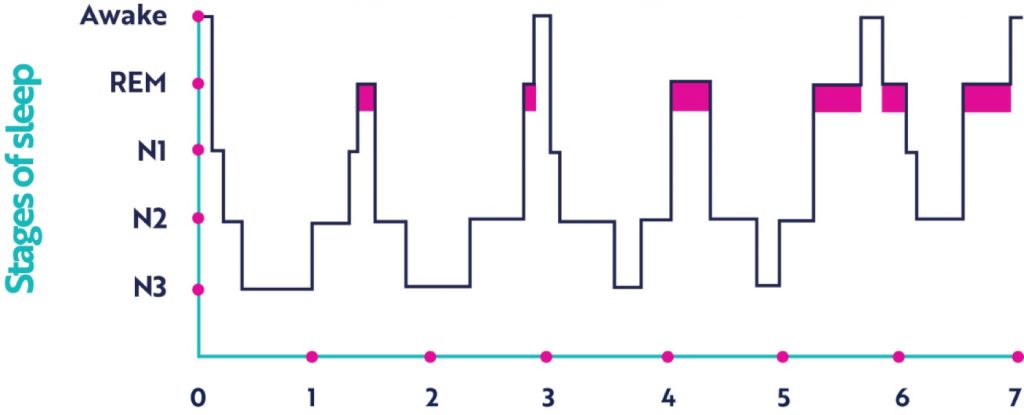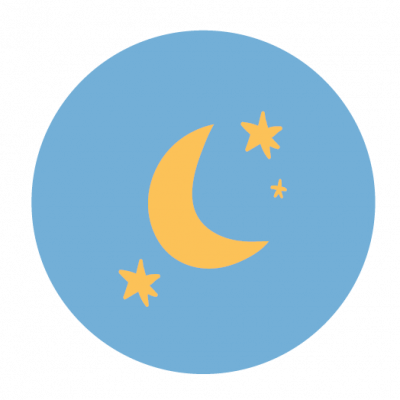Fatigue can have a huge impact on the health and wellbeing of all our staff, both physically and mentally, and shouldn’t be accepted as simply being part of working in the health service.
We have a responsibility – and duty – to look after ourselves to help you provide the best, and safest, care for our patients.
Why we sleep
We all talk about ‘going to sleep’ without really thinking much about what it means.
It may seem like a waste of time in our 24/7 world but sleep is not a luxury – it is a biological necessity. All animals have a sleep-wake cycle, from tiny fruit flies to humans.
In humans, sleep is vital for good physical and mental health. We need to sleep for normal mood, memory and metabolism. Sleep is also needed for growth, for the immune system and to maintain the right body temperature.
Bad sleep for any reason affects brain function. If you sleep badly you feel grumpy and irritable, a little more impulsive and attention and concentration is worse. It is also harder to learn new things – memory processing and new learning happens during sleep.
So, a good night’s sleep is vital for the body and brain to work at their best during the day.
We don’t really remember much about the night when we sleep well but we now know that distinct areas within the brain control a complex and very active process that changes over the night.
If we think of the brain as different electrical circuits then two separate circuits control how long we sleep (the hours) and when we sleep (the body clock – we are designed to sleep best at night when it is dark).
We need more sleep when young and when we are ill but a little less as we get older. Body clocks do change – with teenagers happy as night owls but most of us falling asleep earlier as we get older.
In the Trust’s sleep clinic, we can record sleep and look at brain activity (the EEG) and see that there are two main stages of sleep – dream sleep (also called REM sleep) and non-dream sleep (NREM).
We cycle between the different stages about every 90 minutes as adults. We all wake at night although we may not remember this and we all dream a little more in the second half of the night.

Getting the best out of your shifts
Getting the best out of your shifts
Many of us work shifts. We need to! Hospitals are only open from 9am to 5pm and our patients need care both day and night.
However it is really important to make sure you – and your patients – are getting the best night’s sleep that you can. A rested health professional is a better health professional!
Sleep is flexible; when normal sleepers are studied, they sleep different amounts of time on different nights of the week. But it is worth adding up the total number of hours in an average week…
Is it 40, 45 or 50? For most adults – sleeping under six hours a night on a regular basis will make them feel tired – how do you feel when you wake up in the morning?
If you wake up feeling fine and refreshed – then you are probably getting things right and having enough sleep. Different people need different amounts of sleep. Shift work does make us sleep at the wrong times for our body clock and can cause us to get too few hours in bed.
One phrase sleep researchers have used recently is ‘social jet lag’ – the idea of sleeping a lot longer on your free days compared to your work days.
This can be a sign that you are running a little short of sleep on your work nights. Making sure there is enough of a gap between one shift and the next is important, at least 11 hours if at all possible.
This might mean you don’t arrange too many things to do on your days off so that you do get a chance to catch up and you plan ahead for your shifts to protect your sleep as much as possible.
There are some useful tips for shift work in the links below if you need more information and ideas.
There are also some really good tips to fight fatigue during the shift from the anaesthetic team – you may have seen their leaflets around the hospital?
Wide awake at the wheel?
Driving after a night shift can be a risky time and many people find a different way to get home to avoid a long drive.
We often get a sense of relief from completing our shift and handing over patient care.
For the first few minutes at the wheel we might feel fine but long drives should be avoided if at all possible after a long night, particularly those over an hour. There are some warning signs when we are getting sleepy behind the wheel.
We can start to have ‘microsleeps’ – these are fleeting, uncontrollable, episodes of sleep lasting a fraction of a second up to 10 seconds, seen when a sleepy person is trying to remain awake. Some people recognise the ‘nodding dog’ as their head drops forward.
Things like turning on the cold air in the car, chewing gum or playing music are things people often do when they are feeling tired to keep awake. This may seem like a good plan but needing to do this in the first place is another warning sign of sleepiness. It may be better to pull over.
Hitting the rumble strip, or a near miss on a recent journey are other warning signs for sleepy drivers. Make sure you and your work colleagues all get home safely.
This video shows a simulated driving test done after a 12 hour night shift.
BBC Inside Out South – Sleepy Shift WorkerDriving while critically tired is illegal and & people have lost their licences because of this.
Driving after being awake 20 hours is equivalent effect of driving over the legal alcohol limit, which we would not do.
You may also find this poster useful.
Safe to drive home posterTop tips for a peaceful night
This is a short list for a long goodnight – don’t overcomplicate something that works best when you don’t think too hard about it.
If you fall asleep easily and wake up refreshed then don’t read any further and keep doing what you are doing!
- Keep the bedroom cool, dark and quiet.
- The bedroom is for sleep, do everything else somewhere else (OK getting dressed is fine)
- Screens out – yes that includes a whale song! Those pop ups you say you never look at, the last minute email… We all enjoy the Chief Executive’s blog but read it during the day.
- Night follows day – what you do during the day makes a big difference to the night. Outdoors in natural light every day and out of breath exercise are really good for sleep, not just daytime energy levels. Any kind of high intensity exercise deepens sleep.
- Coffee – we are all different but if you don’t fall asleep easily or wake a lot, count the cups. Cut down if more than three to four a day and don’t drink it after lunch!
Where to get help if you need it?
If you are struggling to stay awake – or fall asleep – and you feel it is causing you problems, there is lots of help available and often some simple things you can do to work out what the problem is.
We have included some useful resources below to all sorts of sleep problems.
These should help you determine things you can do to improve your own sleep and some which may need help from GP or occupational health. We have also included some new sleep groups that you might find useful to join.
Restless leg NHS – Insomnia Obstructive sleep apnoea NHS – Sleep walking Obstructive Sleep Apnoea (OSA) Sleeping problems – NHS self-help guideInsomnia and struggling to fall asleep
Worry, uncertainty and stress all jeopardise our sleep and may contribute to short-term insomnia.
Sleep makes significant contributions to physical resilience (e.g. immune function) and psychological wellbeing (positive mood, resistance to stress). During this difficult time, it is important to maintain a healthy sleep pattern.
Remember that insomnia, in its short-term form, is a normal biological reaction to stress. In most cases your sleep should return to normal when the stress goes away or you begin to cope with the stress.
Here are some simple tips to help you deal with your short-term insomnia and help prevent it from becoming a longer term problem.
- Do not be tempted to watch or read about the news
- A perfect way to break up the day from the night is to complete a daily diary. You might find it helpful to note down some of the things that have gone well today. You might not know what kinds of challenges tomorrow will bring and this is ok, many of us will feel exactly the same. Jot down a to-do list for tomorrow, for example remember to call a friend or a relative, walk the dog or buy some milk – no task is too big or too small! Not only does this put the day to rest but also clears out the mind and gives you a sense of control.
- Word games or visualisations based on categories (e.g. food, animals, capital cities) are also good distractors
- Keep a pen and paper beside the bed for when you find yourself running through problems in the night. Jot them down to be dealt with tomorrow by your “future self”.
- Remember – “if not tonight then tomorrow”. You may not sleep well tonight, but by following your normal schedule the next day (even if feeling tired), your body will have built it’s “appetite” for
- At bedtime avoid working, reading or responding to emails, taking difficult phone calls, screen time, watching or reading the news.
- Remember to eat when you can. It is most important to eat within one hour of waking up to help support your circadian rhythm. This is basically a 24-hour internal clock that running in the background of your brain which switches between sleepiness and alertness at regular intervals. It’s also known as your sleep/wake cycle.
Check your environment
Understandably, your sleep environment may not be the one you are used to during this time. Although a cool, quiet and dark place is best, you may not have control over this at the moment. Where you are able to:
- Try to reduce noise
- Try and make the space as dark as possible. If this is difficult, wear an eye mask
- reduce “clutter” – remove anything that does not promote sleep (e.g. electricals, clocks, snacks).
To help keep your circadian rhythm strong:-
- try spending your breaks outside or even close to a windowtry and spend your daily dose of exercise outdoors
- Caffeine can be a useful tool to help keep you alert during the day, but avoid caffeine in the four hours before bed
- Limit alcohol as much as possible – it impacts on the quality of your sleep, leaving you feeling unrested when you wake up
- Try not to eat a heavy meal in the two hours before bed – but don’t go to bed hungry either!
- Limit how much fluid you drink in the four hours before you go to bed. It will only lead to toilet trips through the night
